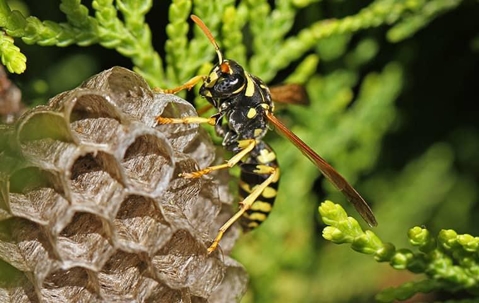Wahoo! Summer is almost here! But along with beautiful summer days comes the threat of stinging insects in your yard, at your family BBQ and around the pool. There are many different stinging insects that we encounter during the warmest part of the year including honey bees, bumble bees, paper wasps and yellow jackets. To help you get more familiar with these insects without having to get up close and personal (which we definitely don’t recommend!), here are some of the distinctive features of these insects:
Honey bees- These insects are actually very beneficial. They help to pollinate plants and flowers as well as create honey. They tend to be orange and brown or black and they are capable of stinging but rarely do, as it often means death for them. They possess a barbed stinger that is lost in the victim when they use it to sting.
Bumble bees- Slightly larger than honey bees, bumble bees appear to be fuzzier; they also possess a barbed stinger but they don’t lose it when they sting their victim. These stinging insects are not known to be aggressive and usually only sting when stepped on or provoked.
Paper wasps- These stinging insects can be black, yellow, orange or brown with grayish colored wings. They have a lance-like stinger that allows them to sting repeatedly and they can become aggressive if provoked.
Yellow jackets- Perhaps more commonly known are yellow jackets with their yellow and black or white and black banded abdomens. Yellow jackets have shorter legs than paper wasps but they share a similar stinger and a similar aggressive attitude. They can form their nests underground too which can be a major hazard in the summertime with kids running around outside.
So, what can be done to keep these little guys from invading your summer fun? Here are our stinging insect prevention tips:
- Keep the grass trimmed short to avoid growing lots of dandelions. Even though these are just weeds, they still attract stinging insects.
- Avoid planting colorful flowers, plants or flowering trees on your property. These can attract stinging insects to your home.
- Fill in any holes in the ground that may be present. Some stinging insects will build their nests in these holes.
- Have a pest control pro apply a preventative treatment to keep these insects away this summer.
- To prevent attracting stinging insects from finding YOU attractive, you should avoid wearing scented oils, perfumes or lotions while spending time outdoors. You should also avoid wearing brightly colored clothing and cover up your entire body while working outdoors.
- If you have a picnic outside, keep food under wraps until you’re ready to eat and pick the food up as soon as everyone is done eating to avoid attracting stinging insects.
Even after you follow all of these tips, it’s still possible to find yourself stung by one of these insects. If you have been stung, keep an eye on your reaction. A typical reaction includes redness at the site of the sting along with itching, burning or minor swelling. If you have a more serious reaction where the swelling becomes severe or you have difficulty breathing, you could be having an allergic reaction and emergency medical attention should be sought immediately.
Some stinging insects in our area are beneficial, but we recommend that you contact us at the first sign of a stinging insect nest on your property. Living in close proximity to these insects can be problematic for you and your family, especially if anyone has an allergy to the sting of these insects. You should never try to get rid of stinging insects or their nests on your own- instead call the pros at Parkway Pest Services for professional control.
Contact us today to learn more about stinging insect control and to schedule your first appointment.

